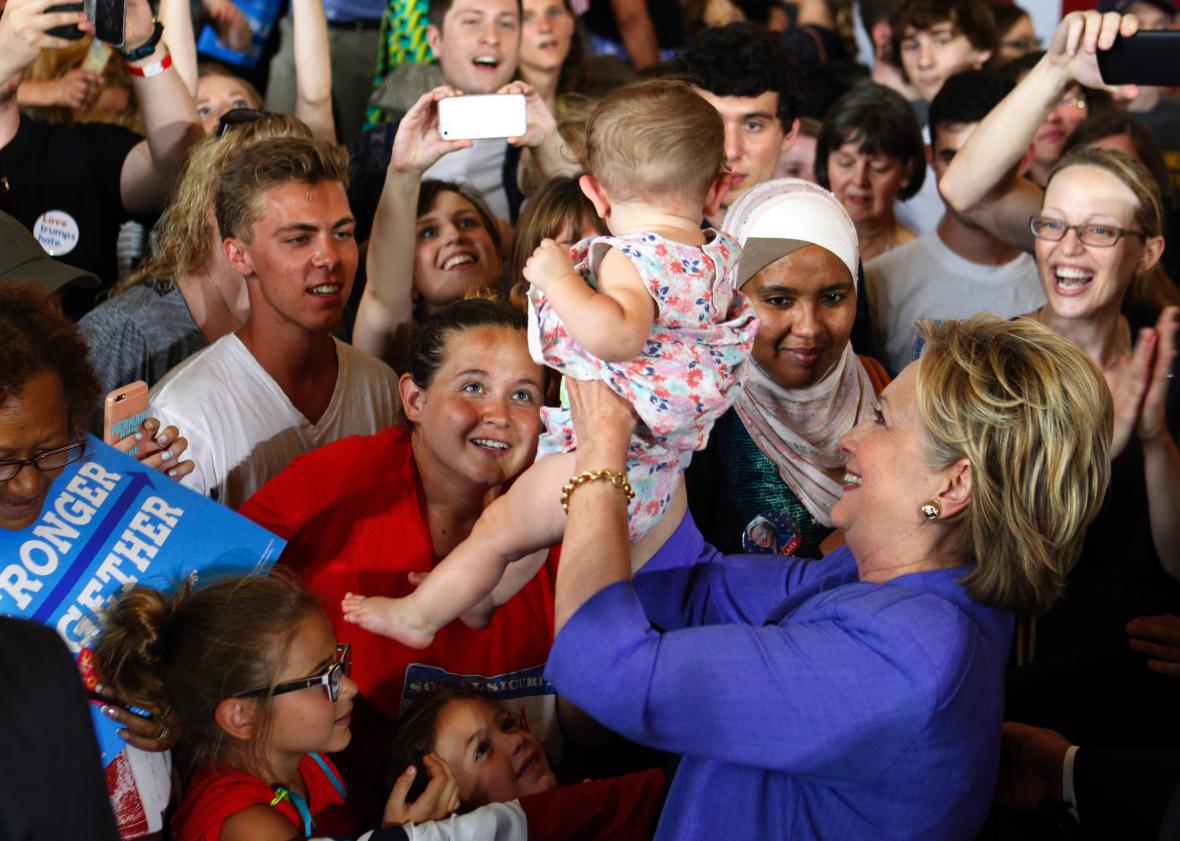Shannon Dingle is a mom of six who blogs about “all facts of [her] life, from family to ministry and products we love to perspectives on race, adoption, faith, disability, and more.” Previously, Dingle was a single-issue voter—she strongly opposes abortion—and consistently voted Republican. But over time her loyalty to the GOP has waned, and this year she’s planning to vote for Hillary Clinton, because, Dingle argues, she is more pro-life than her opponent.
In a recent blog post, Dingle explains her decision, which was instigated by Donald Trump’s inconsistency on abortion combined with her realization that Democrats are better at reducing abortion rates than Republicans. She identifies “poverty, education, lack of access to healthcare, and supports for single parent and low-income families” as the “underlying causes” of abortion; and moreover, she believes that Democrats’ attention to these issues is the reason why abortion rates went down during the Obama and Clinton administrations while rising during the Reagan presidency and remaining the same during the George W. Bush’s tenure.
Dingle emphasizes that this is not a matter of her choosing between “the lesser of two evils” and says she doesn’t “consider it morally appropriate to vote against someone.”
“[I] find enough I can affirm and identify with in the positions and record of Hillary Clinton, so my stance to be with her isn’t based in an opposition to Trump. Aside for abortion – which I do care about deeply – I see the Democrats as the party that champions other pro-life issues more effectively and consistently. This is why I changed my registration to unaffiliate with any party several years ago, after having been a Republican for years, based largely on my abortion stance,” she writes.
Her definition of pro-life is uncommonly expansive. She includes:
- “the lives of people with disabilities,” (a practical concern because her children have been diagnosed with a range of disabilities including epilepsy and cerebral palsy)
- “the lives of women who would otherwise get abortions,” calling for increased access to birth control for low-income women
- “the lives of all women,” linking to the “Women’s rights and opportunity” page on Clinton’s website, where the campaign pledges to reduce the pay gap and fight for paid leave
- “the lives of refugees and other immigrants,” explaining how she has gotten to “to know and teach and love and worship with immigrants, many of whom were undocumented and came with hopes of a better life”
- “the lives of racial and ethnic minorities,” pointing to Clinton’s history of fighting racial discrimination and Trump’s history of being accused of it
- “the lives of religious minorities,” arguing that placing “limits on the expression of faith of any group…[erodes] religious freedom for all groups”
- “the lives of the LGBTQ+ community,” bringing up the high rates of suicide and bullying among LGBT youth
- “the lives of those with HIV/AIDS here and around the world,” which Clinton has a record of advocating for
- “the lives of our armed forces,” which Clinton, she says, is better-suited to lead
- the “lives of those killed by gun violence.”
Dingle’s reframing of pro-life is powerful, even touching, for two reasons. One, it lacks the tunnel vision some anti-abortion advocates bring to their definition of “life.” Her commitment to the unborn is equal to, if not less than, her commitment to the life all around her. Two, it’s a good reminder for those fighting for reproductive rights that they share some interests with those on the other side and could benefit from working with them at times. In fact, such collaboration is already taking place in the fight against pregnancy discrimination, in both state legislatures and in courts, and women of all stripes are reaping the rewards.
One possible benefit of Trump’s unorthodox campaign is that it will make way for more anti-choice conservatives like Dingle to break free from traditional party politics and come out in support of policies like paid leave, pregnancy discrimination, and fair pay. Progressives would do well to consider welcoming them aboard.
